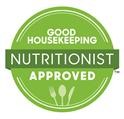 If you need more proof that mainstream consumers are seeking health through the food they buy, look no further than this announcement about the new Good Housekeeping nutrition lab and launch of the new emblem: “nutritionist approved.”
If you need more proof that mainstream consumers are seeking health through the food they buy, look no further than this announcement about the new Good Housekeeping nutrition lab and launch of the new emblem: “nutritionist approved.”
The effort is underpinned by the Good Housekeeping Food and Nutrition Brand Lab Incubator, located in the GH Institute in New York City. The goal of the program is to empower consumers to “confidently navigate crowded supermarket shelves and make healthier purchases.” Ultimately, GH hopes to inspire people to make healthier food choices, and to inform food manufacturers with healthy product development and brand messaging.
GH says that foods approved with the emblem are screened to be:
- Nutritious, based on real, whole foods;
- Transparent, avoiding using marketing language that implies the foods are better for you than they really are; and,
- Simple, making it easy to choose healthier options.
The first nine companies to receive the GH nutrition emblem are:
- Dole mixes and Dole slaws
- Luvo’s line of frozen meals
- Chelan Fresh “farm fresh fruit on-the-fly”
- Panatea instant matcha tea (with no added sugar like other instant beverages)
- Garden Lites Mighty Muffins (with 120 calories per muffin, with vegetables listed as the first ingredient)
- Larabar snack bars
- Jarlsberg cheese sticks
- Beanitos chips (made from pulses such as navy, white and black beans)
- Carrington Farms paks.
 The nutrition program will apply the kind of principles and rigor that GH has used for household goods since the organization first published its Seal of Approval in 1909.
The nutrition program will apply the kind of principles and rigor that GH has used for household goods since the organization first published its Seal of Approval in 1909.
Health Populi’s Hot Points: This GH story is part of a much larger trend toward recognizing that the social determinants of health — food, transportation, safe housing and neighborhoods, walkable towns, education, good jobs with benefits, and social connections — all feed into health well beyond what the healthcare system can do. Noncommunicable diseases are highly preventable and treatable by bolstering social determinants, and healthy food and nutrition play a central role in doing so.
 Note in the report I covered from PwC in yesterday’s post on re-imagining primary care that doctors cite nutritionists and dietitians as the #1 addition they would like to make to join their care team. And, a new report on Public Health 3.0 from the U.S. Department of Health and Human Services places the social determinants of health as a top priority for improving public health in America. In particular, #PH3 promotes cross-sector partnerships between public health folks and other parts of the health/care landscape…including food systems.
Note in the report I covered from PwC in yesterday’s post on re-imagining primary care that doctors cite nutritionists and dietitians as the #1 addition they would like to make to join their care team. And, a new report on Public Health 3.0 from the U.S. Department of Health and Human Services places the social determinants of health as a top priority for improving public health in America. In particular, #PH3 promotes cross-sector partnerships between public health folks and other parts of the health/care landscape…including food systems.
GH’s key values for nutrition – simplicity, transparency, and innovation — fit well into America’s transition to Public Health 3.0.




 Thank you, Trey Rawles of @Optum, for including me on
Thank you, Trey Rawles of @Optum, for including me on  I was invited to be a Judge for the upcoming
I was invited to be a Judge for the upcoming  For the past 15 years,
For the past 15 years,